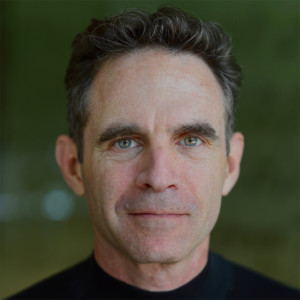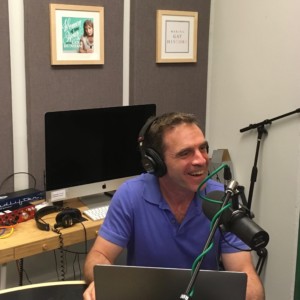Eric Marcus and Sara Burningham first met over the garden fence of their abutting backyards in the Manhattan neighborhood of Chelsea in 2010. As their friendship grew, Burningham discovered that Marcus was sitting on a bumper crop of content, and she knew just what to do.
He never thought he’d be a podcaster and the podcast wasn’t even his idea.
Marcus is a giant in the world of LGBTQ+ history. His public work dates back to his groundbreaking 1992 book Making History: The Struggle for Gay and Lesbian Equal Rights, 1945 to 1990. “My publisher was nervous about using the word ‘gay’ in the title at the time,” Marcus tells me. In 2002, after public sentiment had started to shift, the book was republished with the title Making Gay History: The Half-Century Fight for Lesbian & Gay Equal Rights. It’s this name, “Making Gay History,” that went on to become the brand behind the wildly successful podcast Marcus hosts.
In the 1980s, Marcus journeyed across the country to collect approximately 100 stories of LGBTQ+ Americans, some famous and some unknown. Armed with his trusty tape recorder, he’d hit record and capture intimate conversations with some of the biggest names of LGBTQ+ history, from Ellen DeGeneres in her pajamas in her Los Angeles home to trans activist Sylvia Rivera in her New York City walk-up apartment. In living rooms and kitchens, he collected hundreds of hours of audio interviews as research for his book.
After the publication of his book, the tapes sat untouched for years until Marcus donated them to the New York City Public Library with the agreement that they would digitize the recordings. After a career switch to work at the American Foundation for Suicide Prevention, Marcus was laid off in 2015. In his mid-50s and not wanting to author more books, Marcus wasn’t sure what he was going to do next. Then he remembered his interviews.

He called the NYPL and found out they had just finished digitizing the recordings he had dropped off seven years earlier. Marcus then won a grant to use some of the audio files into an educational project for GLSEN, an organization that provides resources and advocacy for the LGBTQ+ community in K-12 schools. “LGBTQ+ history belongs in the classroom,” Marcus says, and he was content with the re-use of his interviews ending there. But his neighbor Burningham knew this audio library was a podcast waiting to happen, and, in 2016, decided to take a podcasting class—a UnionDocs course run by Rose Eveleth—to help Marcus make that a reality.
Podcaster Jenna Weiss-Berman was a speaker in the course that weekend. “[Sara] was playing these incredible old clips for the class that her friend Eric had given her, just the interview audio for a book he had written decades ago. It was gorgeous, intimate, never-before-heard voices of some of the most important queer activists in history,” Weiss-Berman says. “I said to Sara, look, this has to be a podcast and I will help in whatever way I can.”
Weiss-Berman is a formidable name in the podcasting world. After getting her start at Buzzfeed, she went on to win a 2016 Gracie and become a producer at podcasts like The Moth. At the time of the class with Burningham, Weiss-Berman was just founding her own podcasting company, Pineapple Street Studios. The studio’s clients have now included the likes of The New York Times, Lena Dunham, and Hillary Clinton, but Making Gay History was one of the very first projects they ever took on, and their first-ever pro bono project. “Pineapple was a brand-new company at the time, and at that time we were just a production house with no original shows of our own,” Weiss-Berman says. “So I signed on as an editor and engineered the recording sessions in our small Brooklyn studio.”
Marcus and Burningham gave themselves an intense five-week crash course in developing a podcast by creating the first season of Making Gay History (MGH). With a grant from the Arcus Foundation, and LGBTQ+ history organization History UnErased needing content for October, the trio pulled together 10 episodes and a website in just over a month.
In the early years, they used GLSEN as a fiscal sponsor, which allowed them to receive grants and donations as a nonprofit through them. MGH won grants through the Ford Foundation and other funders, as well as thousands of dollars in donations from individuals. (They’ll be their own 501(c)(3) nonprofit soon.) Pineapple Street Studios continues to give MGH pro bono use of their studios and staff. “There have been many angels along the way,” says Marcus.
He remembers checking on how many people had listened to the first season and being blown away that the number was in the tens of thousands. After being featured on NPR, NBC, and other outlets, the listenership grew. Over the seven seasons, the episodes have been downloaded over 3.2 million times across over 200 countries and territories.
Each episode of MGH focuses on one person’s story. Marcus gives a two- to four-minute introduction giving context and describing the scene where the interview took place. Then, the actual audio of the (edited) interview is played, before Marcus returns for a brief outro. A full episode averages just 20 minutes.
Marcus says Burningham, the producer, is the one who pushes to keep editing until an episode is perfect, but he doesn’t believe in a lot of fluff either: “If you have an echoey one hour and 15 minutes because you don’t know how to properly record and edit, most people don’t want to listen to that.” He says he’ll think an episode is tight and complete, but Burningham will find another way to tinker to make it even better. “I trust Sara’s opinions way more than my own,” Marcus says.
He might trust Burningham’s opinions more, but he does have opinions of his own on what makes a successful podcast, starting with trusting team members like he does: “Share your work with people who know more than you do” and find “joy in the collaborative process,” Marcus says. “Just because you have final word doesn’t mean that you’re smarter than the people you work with.”
MGH episodes are each paired with a webpage with notes and photos, so the podcast employs contractors, including audio engineers, photo editors, episode notes writers, social media writers, graphic designers, and others. Almost all the people hired have come through his personal network. “I think in the more than 25 people I’ve hired to work on the podcast, I looked through résumés once,” Marcus says.

MGH’s unique success story may be nearly impossible to duplicate, but there are still lessons that apply to anyone, like to use what you’ve got. Not many people will have an audio archive laying around, but they might have a collection of figurines they could describe or a group of friends they could interview. Marcus’s number one piece of advice to aspiring podcasters is “be realistic.” No matter what passion they’ll be showcasing, podcasts take a lot of work. It takes a week work for the staff to put together a typical episode of MGH, but some episodes can take months. Marcus warns that podcasting is “more time-consuming and more costly than you might imagine.”
Weiss-Berman’s advice is to be patient (“it takes a long time for something to catch on!”) and to make sure to speak close to the microphone. Also, “success doesn’t have to mean massive listener numbers and money pouring in. If you have 100 dedicated listeners who love and need your show, that’s success.” Burningham thinks that Weiss-Berman’s advice to keep it simple and not over-edit the audio has also helped as well.
Marcus and Burningham have expanded the MGH brand beyond the podcast. Making Gay History is now a play with three productions planned this year, and there’s merchandise, too. They’ve also licensed the audio to other projects like documentaries including Stonewall: The Making of a Monument, which helps fund the podcast. They say no to most commercial sponsorships unless it is a partnership that makes sense (eg. Netflix promoting the Tales of the City LGBTQ+ miniseries but not a company selling an unrelated product).
“You never know where your work will take you,” Marcus says, reflecting on how he never thought he’d be a podcaster and the podcast wasn’t even his idea. When Marcus first said the words “I’m gay” out loud—at the age of 17 on July 31, 1976 in Queens—he thought that fact would ruin his life. Now, almost 62, he lives happily with Barney Karpfinger, his partner of 26 years, in Manhattan and is touched by the emails he gets from around the world about MGH’s impact and how international fans translate the transcripts into Russian, Portuguese, and Spanish.
“There are people living and dead who put their trust in me to tell their stories,” Marcus tells me. He has no plans to stop working any time soon.




Comments